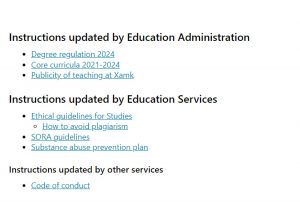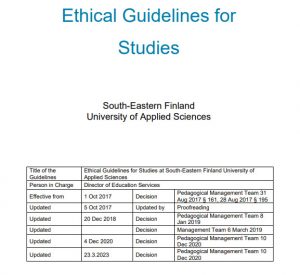
Ethical behaviour and conduct – studies and work
Vol 26, Issue 20, 22 March 2024
Whether at school, university, or the workplace, ethical behaviour is instilled in us to act appropriately, follow the rules, and to never take advantage of situations or of others in a way that would go against ethical principles. In simple terms we use the term “cheating” in academic settings, and plagiarism when it comes to producing work copied from others’ ideas. Now, with the nascent rise in AI, we also see many taking advantage of technology to produce work on their behalf – something I have previously discussed. We often use the term “fraudulent” to describe similar unethical behaviour in relation to working life and work produced for or even by an employer. We could go even further discussing copyright or trademark infringement – but that is perhaps something for a future article.

At Xamk, as is the norm in academic institutions, we have ethical guidelines for students that explain what is ethical behaviour and what is unethical in relation to studies and the study environment. As you would expect, most of the guidelines refer to study attainments and an individual’s behaviour in how they produce the work required for their studies, how they work on tasks, and how they take for example, course unit examinations. Students also need to remember that the guidelines also relate to practical training and theses. The guidelines refer to the use of AI, as mentioned above, but also to using work produced by others, such as selling, distributing, or even purchasing work that others have produced. In addition to all this, the guidelines also explain that completing course work as a so-called “free-rider” – lettings others complete the work for you, e.g. in teamwork – is also considered as unethical and is classed as misconduct.

We all have a responsibility to act according to ethical guidelines, and especially when it comes to academic integrity. Someone who is found to have gone against this, often loses the trust of others, and more. So, what happens if a breach of ethics by students is noticed either by the lecturer, supervisor, or even other students? Well, students have a responsibility as part of the student body, if they observe any unethical behaviour to bring it to the attention of the course lecturer or exam supervisor, depending on the situation. When a lecture suspects such breaches of ethics, or something is brought to their attention, they have a duty to inform the Director of that field of education, who will then conduct a disciplinary hearing. If the outcome of the hearing is that the behaviour was unethical, then action is taken again the student. This can result in a written warning from the President of the university, and in some cases, even a suspension of study rights. For tuition fee paying students, this also has financial implications as they will not be able to apply for any scholarships related to tuition fees or Finnish language scholarships.
Xamk also has a ‘code of conduct’ that goes further to outline how people should behave in the study and work environment. Everyone has the right to a “safe and peaceful” place of study and work. No-one should disturb that right for example, either through insults, harassment, bullying, racism, aggression, or assault. Anyone found guilty of violating this code of conduct could face much more serious consequences as these issues are dealt with through labour laws and even criminal codes, and instances could be passed on to police authorities for further investigation and action.
It should go without saying, that any form of cheating or deception in study attainments is not acceptable, but still there are some individuals that will take the risk of being caught, whether through being short of time, not sure of what to do, or simply through laziness – but there is no excuse for cheating. At the same time, inappropriate behaviour especially towards others cannot be tolerated in a civil society, whether at school, work, in private, or in public. We have to remember that the rules and regulations we study, work, and live by, are set out for the protection of all.
Xamk degree regulations, ethical guidelines, and code of conduct can be found at https://ksamk.sharepoint.com/sites/Teaching/SitePages/Instructions-and-regulations.aspx
- First impressions last – dress to impress for an interview - 15th November 2024
- If we had true unity, could Europe be run like a Business? - 27th September 2024
- BIP – Rijeka, Croatia - 13th September 2024
